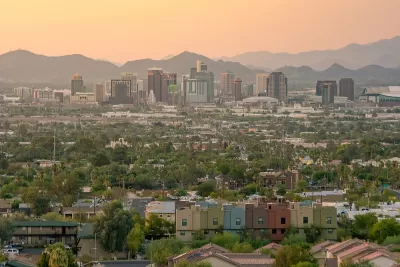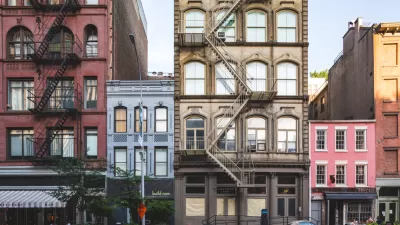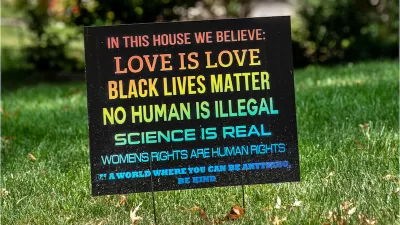A critical question arises in response to an affordable housing project proposed in Phoenix: When measuring a project's affordability, does the larger county's median income matter when some neighborhoods are struggling well beyond that measure?

"A developer plans to build 161 mixed-income apartments and 64 townhomes in south Phoenix where residents can work toward ownership, but critics say say [sic] the homes aren't affordable enough," reports Megan Taros.
Here's how the affordability of the proposed development breaks down in context of Phoenix's economic conditions:
The project, by Chicanos por la Causa, has promised that 10 of the units will go to residents earning 30% to 60% of Maricopa County's median income of $77,800 for a single family.
Eligible renters are capped at 60% of this area median income, making it 100% affordable according to U.S. Department of Housing and Urban Development standards.
But many residents in the neighborhood make far less than the project's asking prices. The average median income for residents in the 85040 ZIP code, where the project is proposed, is less than $39,000 a year, according to American Community Survey data cited in the article.
With light rail expected to arrive in the neighborhood by 2024, local activists are predicting that the project is a sign of gentrification to come. "SoPho Convening, a community organization dedicated to equitable economic development, and residents asked the Phoenix City Council in July to delay approval to allow Chicanos por la Causa to work with stakeholders in the project," according to Taros.
The project has achieved mixed success during the planning approvals process. The South Mountain Village Planning Committee voted to reject the project, but the Phoenix Planning Commission voted to approve.
FULL STORY: Affordable housing coming to south Phoenix, but residents say it’s not affordable enough

Planetizen Federal Action Tracker
A weekly monitor of how Trump’s orders and actions are impacting planners and planning in America.

Map: Where Senate Republicans Want to Sell Your Public Lands
For public land advocates, the Senate Republicans’ proposal to sell millions of acres of public land in the West is “the biggest fight of their careers.”

Restaurant Patios Were a Pandemic Win — Why Were They so Hard to Keep?
Social distancing requirements and changes in travel patterns prompted cities to pilot new uses for street and sidewalk space. Then it got complicated.

Platform Pilsner: Vancouver Transit Agency Releases... a Beer?
TransLink will receive a portion of every sale of the four-pack.

Toronto Weighs Cheaper Transit, Parking Hikes for Major Events
Special event rates would take effect during large festivals, sports games and concerts to ‘discourage driving, manage congestion and free up space for transit.”

Berlin to Consider Car-Free Zone Larger Than Manhattan
The area bound by the 22-mile Ringbahn would still allow 12 uses of a private automobile per year per person, and several other exemptions.
Urban Design for Planners 1: Software Tools
This six-course series explores essential urban design concepts using open source software and equips planners with the tools they need to participate fully in the urban design process.
Planning for Universal Design
Learn the tools for implementing Universal Design in planning regulations.
Heyer Gruel & Associates PA
JM Goldson LLC
Custer County Colorado
City of Camden Redevelopment Agency
City of Astoria
Transportation Research & Education Center (TREC) at Portland State University
Camden Redevelopment Agency
City of Claremont
Municipality of Princeton (NJ)





























